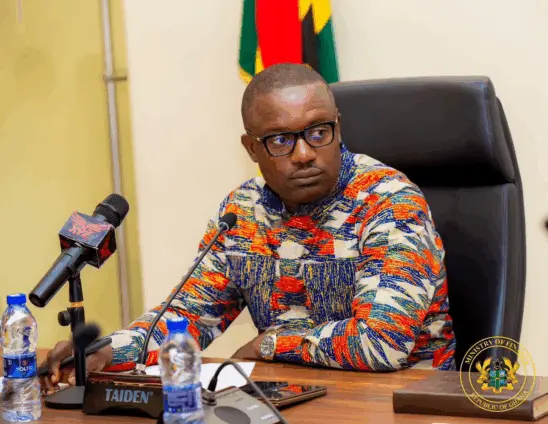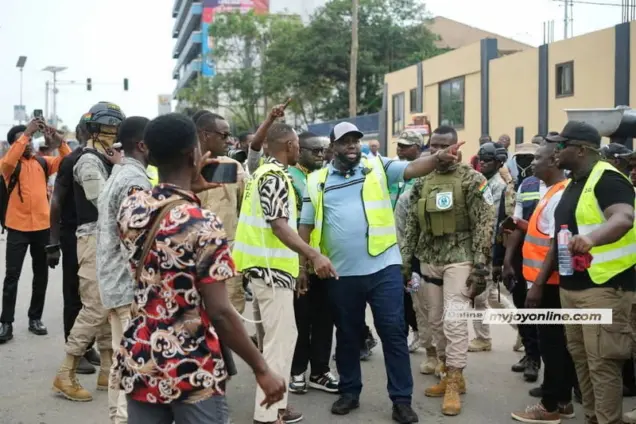Accra, Ghana – In a surprising turn of events, the Ghanaian cedi has recently experienced an unexpected surge in value. But behind this appreciation lurks a growing debate: Is this newfound stability sustainable, or are there hidden costs that Ghanaians will ultimately bear? Dr. Gideon Boako, a prominent Member of Parliament’s Finance Committee, is raising crucial questions about what he describes as potential government spending misalignment under the current NDC administration, linking these fiscal actions to the cedi’s rise.
Dr. Boako’s concerns center on the possibility that funds intended for critical sectors of the economy may have been redirected to influence the exchange rate, specifically through the Ghana Gold Board (GoldBod). This article delves into these allegations, exploring the implications of potential fund redirection and the overall effect on Ghana’s economic stability, drawing insights from Dr. Boako’s recent interview on JoyNews.
At the heart of the matter is whether the recent appreciation of the cedi is a genuine reflection of economic strength or a temporary fix fueled by potentially unsustainable fiscal practices.
Dr. Boako alleges a worrying case of government spending misalignment. He has questioned the source of funds being utilized by GoldBod to aggressively purchase large volumes of gold. According to Dr. Boako, this raises the specter that revenue streams earmarked for vital sectors of the economy may have been covertly redirected to prop up the cedi.
“There is expenditure misalignment, so far as I see,” Dr. Boako stated. “And when Parliament resumes, we are going to ask a lot of questions.” His concerns highlight the lack of transparency and accountability that could potentially undermine long-term economic stability.
A key point of contention revolves around the government’s strategy of using cedis to buy gold, converting it into dollars, and then injecting those dollars back into the market. The aim is to artificially influence the exchange rate. But Dr. Boako argues that this approach raises significant concerns about fiscal discipline.
“They used cedis to buy the gold, sell to get foreign exchange,” he explained. “The cedi revenue we are generating, which ought to finance critical expenditures, is rather being used to buy gold in the name of GoldBod and then converted into dollars to stabilise the currency.”
This strategy, while potentially yielding short-term gains in the cedi’s value, could be diverting resources from other essential areas, setting up a precarious situation for the future.
A significant discrepancy in funding further fuels the controversy surrounding government spending misalignment. In the 2025 budget, the Finance Minister initially allocated between $200 and $400 million to GoldBod. However, GoldBod’s spending has reportedly ballooned to nearly $3 billion, raising questions about the origin of these additional funds.
“In the 2025 budget, the Finance Minister said he was going to allocate something around 200 or 300 something million dollars for the goldbod to buy gold. Today, the amount of gold that this government has bought is close to 3 billion dollars,” Dr. Boako pointed out.
This drastic increase in spending begs the question: Where did the money come from? Potential sources include the Central Bank or direct allocations from the central government. This unplanned spending may be draining public resources, leading to complaints from ministers about the Finance Minister’s failure to release funds for their respective sectors.
“So the question is if the government budgeted for let’s say 300 or maximum 400 million dollars for the fiscal year for goldbod, and goldbod has spent close to 3 billion dollars, where did that money come from,” Dr. Boako questioned, underscoring the lack of clarity surrounding GoldBod’s financial operations.
Ultimately, the long-term stability of the cedi could be undermined by these practices. Funds diverted to GoldBod could be impacting funding for essential ministries and services. This lack of transparency raises concerns about accountability and could lead to long-term economic instability, impacting the lives of ordinary Ghanaians.
Dr. Boako insists that the Finance Minister must provide a comprehensive account of this discrepancy. He demands a clear explanation of how GoldBod managed to spend nearly $3 billion in just four months. He wants the issue of expenditure misalignment to undergo thorough investigation. “That whole issue of expenditure misalignment is something that ought to be investigated,” he asserted. “We need to understand where GoldBod is getting the $3 billion they have used so far to buy gold.”
Dr. Boako’s statements cast a shadow of doubt over the sustainability of the cedi’s gains and raise broader concerns regarding transparency and fiscal discipline within the government. Further investigation is urgently needed to ascertain the true source of funds utilized by GoldBod and to evaluate the long-term impact of these policies on Ghana’s economic stability and the well-being of its citizens. It remains to be seen if the parliament will seek further information regarding government spending misalignment.
Image Source: MYJOYONLINE





















